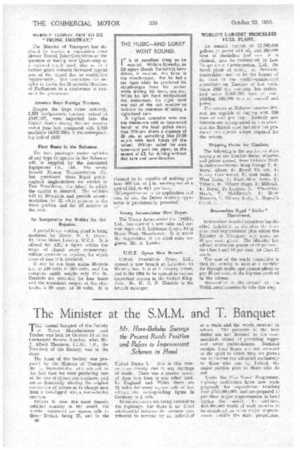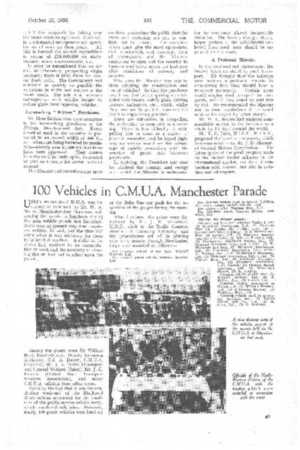The Minister at the S.M.M. and T. Banquet
Page 42

Page 43

If you've noticed an error in this article please click here to report it so we can fix it.
Mr. Hore-Belisha Surveys the Present Roads Position and Refers to Improvement Schemes in Hand
THE annual banquet of the Society of Motor Manufacturers and• Traders was held on October 14 at the Connaught Rooms, London, when Mr. J. Albert Thomson, LL.D., J.P., the President of the Society, was in the chair.
The toast of the Society was proposed by the Minister of Transport, Mr. L. Hore-Belisha, who referred to the fact that we were producing cars at the rate of almost one a minute, and are so drastically altering the original conception of nature as to change man from a two-legged into, a four-wheeled creature.
Britain is now the most densely vehicled country in the world, the number registered per square mile in Great Britain being 23, and in the
ES United States 8. Nor is -this com parative densit3r due to any shortage of roads. There was a greater extent of them here than in any other land. In England and Wales there are 21 miles for every square mile of territory; ,the corresponding figure in Germany is i mile.
Increasing sums are being devoted to the highways, but there is no direct relationship between the amount contributed to revenue by an individual or a trade and the worth received in return. The proceeds of the beer duties are not devoted to the commendable object of providing bigger and better public-houses. National receipts from liquor are not returned in the spirit in which they are given ; nor is income tax allocated exclusively to those who pay it. Indeed, the major portion goe's to those who do not.
Under the Five Years' Programme, highway authorities have now made proposals for expenditure totalling over £140,000,000, and are prepared to put these major improvements in hand during the period. In addition, £16,0110,000 worth of work remains to be completed on other major improvements outside the main programme,
and if the proposals. for taking over the trunk roads he approved, there will be a 'substantial enlargement and speed ing tip of work on these roads. All this is. beyond the annual expenditure in excess of £35,000;000 on maintenance, minor improvements, etc.
It mhst be remembered that we are not, unfortunately, prospecting virgin territory ; there is little room for blazing fresh trails. The Goveraunent will eliminate as quickly as possible the variations in width and surface -of the trunk roads. The aim is at separate carriageways with middle hedges to reduce glare from• :opposing vehicles.
Far-reaching "Ribbon" Provisions.
Mr, Hore-Belistia then drew attention to the far-reaching provisions of the Ribbon. Development Act. Every classified road in the country is protected to an overall" width of 440 ft., and others are being included by resolntion—already over 11,000 miles of these have been approved. They cannot henceforward be built upon, excavated or used as a means for access, without consent The Minister and manufacturers must combine to convince the public that the State and motoring are not in con
flict, but in unison. The manufacturers most give the most up-to-date, safe, comfortable • and economic form of conveyance, and the Ministry endeavour to open out the country to business and travel under the best possible conditions of amenity and security.
Why does the Minister sign regulations affecting the construction and use of vehicles? So that the purchaser may know that he is acquiring a vehicle fitted with brakes, safety glass, driving mirrors, indicators, etc., which, whilst they may not be perfect, represent the latest in engineering practice.
There are difficulties in compelling the pedestrian to cross only at a crossing. There is less 'difficulty in compelling him to cross as a matter of physical necessity, and he hoped highway authorities wduld see the advantage of rapidly proceeding with the erection of guard rails 'wherever practicable.
In replying, the President said that he admired the courage and energy with which the Minister is endeavour
lug to overcome • almost insuperable obstacles." The Society thought that a larger portion of the £70,000,000"collected from road users should be expended on the roads.
A Profound Mistake.
In the road and rail controversy, the Society takes its stand by road transport. He thought that the railways ware making "a profound mistake in considering that they should have a transport monopoly. Certain users would employ road transport for their goods, even if they could he sent free by rail. He recommended the Minister not to issue regulations if he could achieve his object by other means.
Mr, W. E. Rootes had rendered cornmendable service to the industry as a whOle by his tour around the world.
Mt. T. G. John, M.I.C.E., M.I.A.E., proposed the toast of the guests, which was responded to by Mr. J. D. Mooney, of General Motors Corporation. The latter spoke of the great progress made by the British inciter industry in the international market, not Only in connection with motors, but also in aviation and oil engines.




























































































